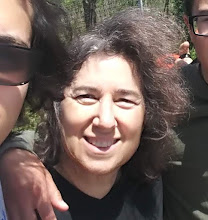I’ve been spending this week with Mrs. Simon Kuhn, a.k.a. Setty Swarts Kuhn, or more familiarly: Aunt Setty. Wow. Regine Ransohoff mentioned her to me as a Jewish woman for whom a Cincinnati housing project is named, and suggested that I might be interested in the many other things that she did. Well yes, and thanks Regine!
From her creation of the Better Housing League in 1916 and past her retirement from the Cincinnati Metropolitan Housing Authority in 1950 at age 82, Kuhn worked hard to earn official designation as “outstanding woman of the half-century” in Cincinnati public housing. As one admirer summarized the situation: “the word housing to me has meant Mrs. Simon Kuhn."
But Setty Kuhn’s influence was felt in realms far beyond housing. I can’t begin to describe the range of her communal work here, so let me just cite the list of organizations that co-sponsored a celebration of her career on the occasion of her 70th birthday. In perusing this list, please remember that these were not just organizations in which Setty Kuhn took an active part. No, in almost every case (besides, perhaps the United Jewish Social Agencies) she was a key (and often sole) founder and sustainer.
Here they are: The Better Housing League, the Child Guidance Home, The Cincinnati Chamber Music Society, the Cincinnati Peace League, the Community Gardens, the Foreign Policy Association, The Foster Home, the Geneva Scholarship Fund, the Jewish Convalescent Home, the League of Women Voters, the Losantiville Country Club, the Toscanini foundation, the United Jewish Social Agencies, the University School, and the Woman’s City Club.
A hefty resumé for any community activist, and one that beautifully exemplifies the way that social issues and reform work that often arose in Jewish communal contexts were successfully presented by Jewish activists as matters that required broad communal attention and systematic municipal reform. This will be a major concern in my book, but what struck me most immediately about Setty’s collection of papers were the ways which her friends, family, and colleagues (Jews and non-Jews) found to express their appreciation for her tireless devotion and effectiveness. (And I’m not even going to get into the myriad scores of poems, songs, and parodies written in her honor – those these are genres dear to my own heart).
People loved Setty for what she did:
“There has been continuously one member [of the Cincinnati Metropolitan Housing Authority] that completely exemplifies unselfish and courageous support of an ideal of improving the circumstances of the underprivileged. Whatever the Authority has accomplished has been attributable in the largest measure to your steadfast and devoted concern with basic social betterment.”
And they also loved her, as one letter writer noted, for how she did it:
“More than just starting things and founding organizations and carrying them on, sometimes with great effort, is the spirit and sincerity you put into these matters.”
She was known by so many (including professional colleagues and city officials) as “Aunt Setty,” that one nephew felt constrained to admonish her: “And don’t’ forget, I’m the only legitimate nephew, them others are imposters, just a lot bastards.”
Setty Kuhn’s life was not easy. Her father died when she was three. Her husband went through severe bouts of depression and died at an early age – around the same time that one of her three daughters, who was mentally retarded, also died. In fact, many of the institutions that she founded or supported, a home for mentally retarded children, a convalescent home, an inclusive and modern private school, a country club (to serve her ill husband) were efforts to transform challenges that she’d experienced in her own life into broader possibilities for others facing similar challenges.
Some other time, I’ll write about some of the time-bound social attitudes that can undermine our eager idealization of someone like Aunt Setty, but I can only join her friends, her disciples, her colleagues in treasuring the humanity that informed her activism.
One younger colleague who went on to work in public health for the Cincinnati Community Chest was transformed by her first encounter with Setty who she came to regard as the city’s “Number 1 Woman Citizen”:
“I do not exaggerate in saying that you set a pattern of life which has challenged my admiration ever since. My own contribution to these great causes … to which you have devoted your energy, time and money, has been very limited. But at least I accepted your standard of values, preferred your pattern to any other.”
I was particularly struck by a 1938 note from a woman who had taught in the school founded by Setty, but who had left Cincinnati 26 years earlier. She recalled Setty as … “one of the loveliest spirits that have ever touched my life.”
One remembrance of Setty Kuhn asked: “What made her the extraordinary woman she was?” The answer in part: “the intensity of her convictions, the magnetism and persuasiveness which lent an inner glow to her personality, and led her own mother to say of her: ‘Setty could charm the blue out of heaven.’”
In our green age, would that we all could find numerous opportunities and worthy subjects to recycle such compliments … As so many wrote to her during her lifetime: “It is only too bad that there are not a dozen Mrs. Kuhns in Cincinnati.” Not to mention everywhere else.
Wednesday, July 11, 2007
Subscribe to:
Post Comments (Atom)


No comments:
Post a Comment